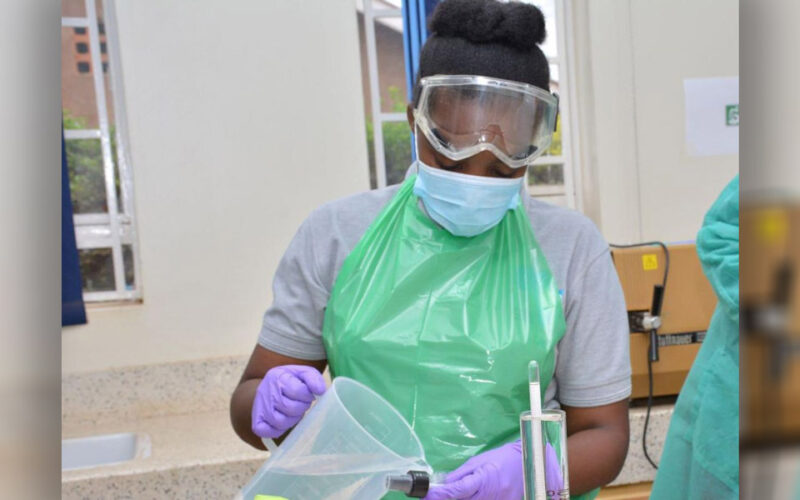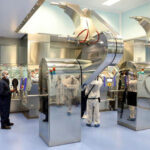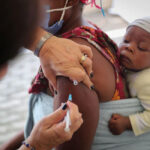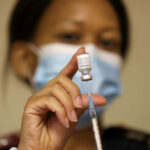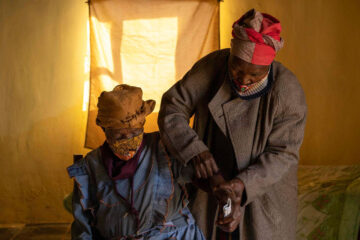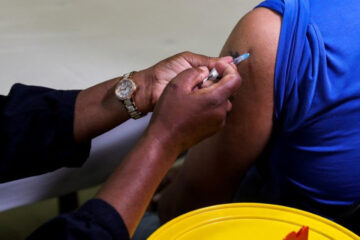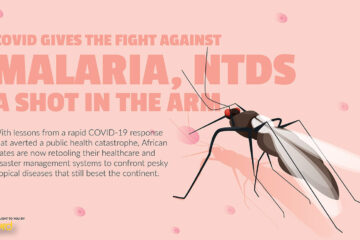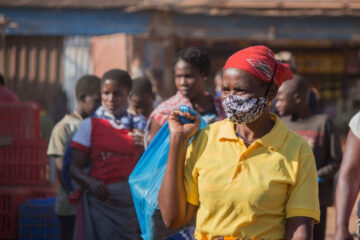COVIDHQ and bird
AS a new wave of COVID-19 infections sweeps Africa, health authorities across the continent are hurrying to get populations vaccinated. The vaccines have all been imported from India, China, Europe or the United States. African academics and academic institutions are looking to ensure that this changes, now and in the future.
An African Covid vaccine?
Pillared and imposing, the neo-classical great hall of the University of the Witwatersrand, situated on a ridge overlooking what was, at the time of construction, the richest gold seam the world had ever seen, is nothing if not a bold statement on the future of learning and academia in Africa.
Its vice-chancellor, Professor Zeblon Vilakazi, – who started with the university early in 2021 –is right at home there, with bold statements part of his repertoire.
The widely-cited nuclear physicist with a passion for science has a deep-seated belief that waiting for imported vaccines from overseas was a wasted opportunity, for Wits, for South Africa and for Africa in general.
“This is a challenging and exciting moment”, Vilakazi said, pointing to the opportunities, as well as the harsher realities, brought about by the COVID-19 pandemic.
Vilakazi says it was a “big mistake” and “regrettable” for South Africa to rely on imports, instead of investing in the technology to produce its own vaccine.
The vice-chancellor has promised that within the next two years and without massive investment from government, Wits will be home to a facility able to produce its own mRNA vaccine. This is the same technology behind the Pfizer and Moderna shots. The university plans to partner with JSE-listed pharmaceutical giant Aspen, or partially government-owned Biovac, to achieve this.
Vilakazi’s statement echo what has become a flood of calls from institutes of learning across the continent. African capacity is in many instances, these calls say, being overlooked.
Wits, is only one among many African universities that have responded positively to the coronavirus challenge. While South Africa and the rest of the continent may be far behind developed countries in vaccinating their populations, a number of African research institutions have already played a considerable role in developing vaccines as well as offering a wide pool of research and innovation talent and capacity, in response to the pandemic.
Wits – among the top 200 universities in the world, according to the Times Higher Education World University Rankings 2020 and the top-rated institute for research in Africa – has already participated in two clinical trials for vaccines, with Oxford-AstraZeneca and Novavax.
This is as the World Health Organisation warns of a “moral catastrophe” if countries with more developed pharmaceutical industries hoard injections, leaving others without.
African solutions to African problems
African universities have been at the forefront of pioneering many of the solutions needed by communities across the continent during the pandemic. Beyond the health sciences, engineering plays a pivotal role and is important in understanding local contexts, such as a lack of electricity supply.
Makerere University, another of Africa’s top universities and which sits on a hill in Kampala, Uganda, has created solutions to some of the country’s and region’s most pressing issues. Scientists there used 3D-printed, biodegradable face shields as well as components for ventilators.
The Health Sciences Department also went a step further than the ubiquitous temperature gun, with academics developing software that takes readings from four places – the throat, mouth, nose and forehead to provide a more accurate temperature reading.
Makerere added to Uganda’s coronavirus response by developing touch-less handwashing stations and translating health messages into six languages, making them more accessible and effective in the linguistically diverse country.
The University of Johannesburg (UJ) pioneered a portable 3D ventilator in March 2020 amid a global shortage of machine and components. A team lead by Professor Saurabh Sinha, the Deputy Vice-Chancellor for Research and Internationalisation at the institution came up with the ventilator, named AURA IMPRIMERE. The ventilator, whose name means ‘a breath of air provided by printing’ is portable and allows off-grid operations for up to one and a half hours.
Funding the research agenda
Sinha, an engineer by training, points out that the research output during the pandemic conducted by the university was not simply for study’s sake but was intended to have an immediate transformative impact on society, making the institution an exciting and innovative place to be.
African universities are recognising the funding opportunities that research offers and are now looking to position themselves to philanthropic organisations, corporations and governments by offering critical resources to guide societies in times of great flux.
Operation Warp Speed in America invested close to 2 billion US dollars in just one contract − with Pfizer − in exchange for 100 million doses of vaccine. The Wall Street Journal reported that the British-Swedish AstraZeneca, which received 1 billion US dollars from the US, paid Oxford University an up-front fee of 10 million US dollar and promised a further 80million US dollars, once Covid-19 is no longer considered a pandemic. While the massive figures used to develop the Covid-19 vaccines by the pharmaceutical companies are out of reach for most African governments and universities, change is afoot.
UJ, for example, was, prior to the pandemic, already preparing for the Fourth Industrial Revolution. Its Robotics, 3D printing, AI initiatives – and many of its funding pitches – focus on this, says Sinha.
There is a temptation for governments to cut funding to universities while they face other health and financial pressures. This can already be seen in S.A where funding is being reduced for the National Student Financial Aid Scheme and certain fields of study. Vilakazi cautions against this, reminding the government that investing in education and skills during difficult times will help to ensure that prosperous times return.
Humanities in the age of robots
Wits, has a strong health sciences team, having learned lessons from the HIV/AIDS pandemic, Ebola and now Covid. Vilakazi points out that science became culturally endemic in the 1960’s and 1970’s after the moon landing and is once again seeing a resurgence as school-leavers look to opportunities to solve the world’s most pressing problems.
With the focus on science and with 4IR becoming a buzzword, many students in the humanities may wonder what their futures hold. However, UJ’s Sinha says the future of higher education is multi-disciplinary or trans-disciplinary, pointing out that, engineering solutions such as water infrastructure or bridges require a societal context and understanding. Vilakazi also says it is important to separate humanities from the social sciences, adding that the software will never be able to replace a musician, a writer or an artist, while being able to replicate almost all other jobs.
How research students are coping
For Tanaka Moyo, a 27-year-old Zimbabwean PhD student, the first year of her doctorate during the Covid-19 pandemic was marked by a need to find innovative ways to continue working.
Moyo is studying xenophobia and the ways immigrants shape their host communities in Johannesburg. The city is an economic hub for all nationalities and its vast urban sprawl and large migrant population has seen poorer parts of the city become breeding grounds for hatred and fear.
Moyo leapt straight from her undergraduate degree in sociology to postgraduate study just as COVID-19 stuck. The first year of her PhD was her toughest yet, she said. “Awful,” was her response to how she had found the experience. She feels she wasted a year, until pivoting and finding her feet.
“Lockdown disrupted me, there aren’t really fixed goalposts [for a PhD], it’s all relative to the schedule, your mental state, your emotional state….I had to let go of the guilt that I wasted a year, “ Moyo said.
She has started working again on her research, which requires lengthy interviews with immigrants, a narrative style of research but here too she finds obstacles in the new world presented by Covid-19.
“I wanted to hang out with people but now this requires WhatsApp calls, I can only reach people who have smartphones so these affects my demographics, the interviewees have to narrate traumatic events over the phone, my methodology will change.”
Moyo’s story is one of thousands of research agendas, funding and criteria that are shifting extremely quickly, racing to keep up with the time-bound research degrees offered by universities.
Africa’s challenge
While Moyo was familiar with support opportunities offered by the university and quickly ensured she had unlimited data available to her, many undergraduates, especially first-year students, were not. Some less fortunate students resorted to taking pictures of their handwritten essays and submitting them via their cellphones.
Dichotomies like this, at the very institution that is the only university on the continent to have been chosen to partner with IBM for quantum computing (powers to solve problems that are currently are currently intractable for classical computers), would seem daunting. Quantum computing and handwritten essays make uneasy bedfellows. They are also a reminder of how often uneasy parallels exist and provide questions for all scholars privileged enough to make their way through halls as large and bold as Wits’. It is also a reminder of the opportunities for research to make a huge difference – and the need for African solutions for African problems.
In that sense, Vilakazi’s bold statements, backed by the research capacity of one of the world’s finest universities, cannot have come at a more opportune time.

